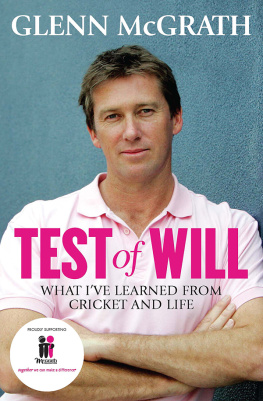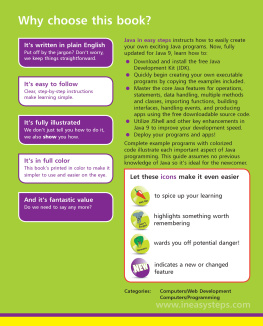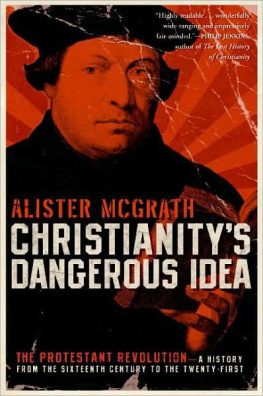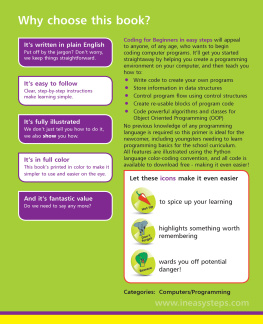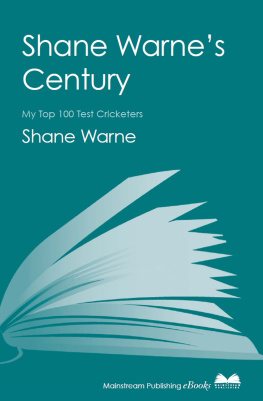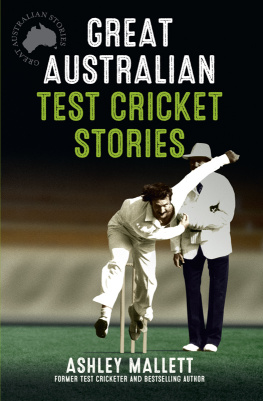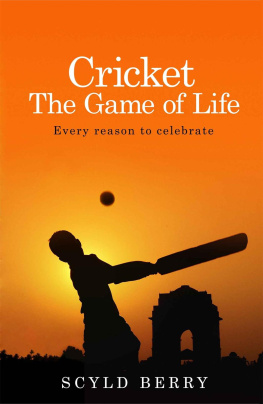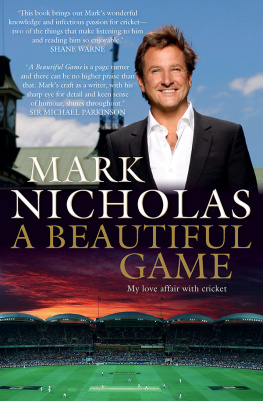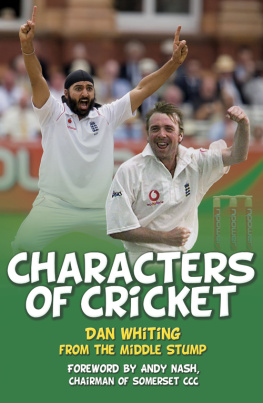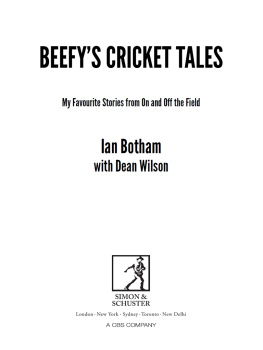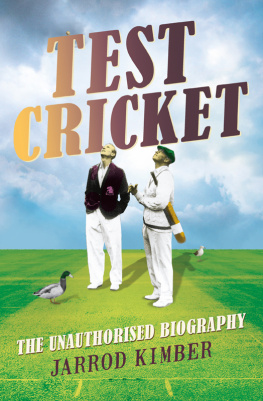
First published in 2015
Copyright Glenn McGrath 2015
All rights reserved. No part of this book may be reproduced or transmitted in any form or by any means, electronic or mechanical, including photocopying, recording or by any information storage and retrieval system, without prior permission in writing from the publisher. The Australian Copyright Act 1968 (the Act) allows a maximum of one chapter or 10 per cent of this book, whichever is the greater, to be photocopied by any educational institution for its educational purposes provided that the educational institution (or body that administers it) has given a remuneration notice to the Copyright Agency (Australia) under the Act.
Allen & Unwin
83 Alexander Street
Crows Nest NSW 2065
Australia
Phone: (61 2) 8425 0100
Email:
Web: www.allenandunwin.com
Cataloguing-in-Publication details are available
from the National Library of Australia
www.trove.nla.gov.au
ISBN 978 1 76011 280 6
eISBN 978 1 92526 841 6
Cover design: Squirt Creative
Front cover photo: Mark Calleja / Newspix
To Sara, James, Holly and Madison
CONTENTS
In three words I can sum up everything Ive learned about life: it goes on.
Robert Frost, poet
Whenever I was asked during my cricket career for the secret to my success, I had a standard answer that rolled off my tongue. I would always say that I controlled the controllables. For the main I found it was an easy mantra to live by, especially on those occasions when I had a six-stitcher in my right hand and a batsman 22 yards down the pitch, giving some cheek and taking guard.
Id learnt from years of practice in the nets that if I cocked my wrist and bowled the ball a certain way itd hit a spot on the pitch that would cramp the batsman and strangle his flow of runs. I found if you bowled a persistent line and length, eventually it would be crickets equivalent of water torture for some batsmen and no matter how good they were theyd eventually crack and succumb to the pressure by playing a rash shot. I could also grip the balls seam in a particular way to fish for a nick off the edge of his bat; or if my attempts to up-end his stumps with a yorker didnt succeed, I always had a plan where I could tempt him to hook to a fieldsman who was strategically placed out in the deep.
Everything I did on the cricket field was aimed at controlling all I could; that allowed me not to stress about those things that were out of my hands. And thats a lot of things in cricket. For instance, if a catch was skied to a fieldsman, no matter how much I wanted him to take it, I knew there was nothing I could do to control whether or not he dropped the ball. Or if someone misfielded, there was absolutely nothing I could do about that. I never worried about the selectors not picking me, I didnt play my career looking over my shoulder and worrying about the next big thing, because I realised if I did my job and took wickets then I was doing everything that was required of me. If Australias batting line-up was in the midst of a collapse, there was little point in me, the No. 11, sitting in the dressing room and stressing out or cursing the batsmen for getting out. Thats cricket, and in cricket blokes get dismissed. All I ever worried about was how I would stand up to the test when the time came. Id get kitted up in my pads and other protective equipment, and Id practise in the dressing room getting behind the ball. Rather than dwelling on the negatives that could take root in my mind if I allowed them, Id repeatedly tell myself that, come hell or high water, I wouldnt throw my wicket away. That was what I realised I could control in that particular situation. I couldnt control what the bowler was going to do when I faced him; I couldnt control what my batting partner might do or even what he might think about me as a batsman, but I could control my thoughts and my actions. I have no doubt that realising early in my career that all that mattered was what I did or how I handled a situation enabled me to escape a lot of the angst that can choke cricketers if they allow it.
An important element of controlling the controllable as a professional sportspersonand its not just applicable to cricket, the controllable concept can be applied to anythingwas to leave nothing to chance during my preparation for a game. I ensured I ate well; I trained hard; I rested. I worked hard to fine-tune whatever was required to improve my bowling actionId stretch; I would treat my niggles; I would swim laps of the pool before leaving the teams hotel for the ground; and I would study the opposing batsmens strengths and weaknesses in video sessions and come up with bowling plans. I also made a point of thoroughly understanding what my role in the teams match plan was. On those days when things didnt go well out in the middleand yes, there were those stinking hot days when it felt as though I was up to my knees in quicksandcontrolling the controllables simply meant keeping my emotions in check so I could focus on the job thats required of a fast bowler, and thats taking wickets!
All in all it was a pretty good philosophy to follow, and for the main its served me well throughout my life. When I was a young boy growing up on my familys farm, Lagoona, just outside of Narromine, it wouldnt have occurred to me to describe my approach to life as controlling the controllables, but even then the process was a good friend to me when my father Kevin was forced to seek extra income by driving road trains between Dubbo and the Top End. My younger brother Dale and I were left to look after the farm, and now, as a 45-year-old, when I look back on that period of my life I realise it could easily have been a situation that overwhelmed me. After all, I was still a kid of 16 and Dale was 14. We were responsible for tending the crops and looking after the livestock, and without me even noticing it I got through each day by focusing on those controllables. Of course I missed my dads guidance, but I accepted it was pointless to moan about his absences, when he was behind the wheel of a massive truck carting cattle to and from Darwin. So I woke early each morning, and I prepared for the day by having a decent breakfast. Wed plough the land, wed harvest the crops or do whatever it was that particular day demanded. After that, my focus was set on the next job and the one after that and that
Even as a cricketer I controlled when it was time for me to step down. Im proud I went out on my own terms. Not too many players do. My farewell Test at the Sydney Cricket Ground, my home ground as a New South Welshman, finished remarkably.
I can only recall bits and pieces of what was an emotion-charged five days. But I do remember a journalist asking me during a television interview, if I could take anything from the Test, what would it be? I answered that Id walk away feeling very pleased if I took a wicket with my last ball. Well, perhaps the universe was listeningas it does from time to timebecause thats what happened. I captured Jimmy Andersons wicket when Michael Hussey caught him off my last ball, a slower one. I remember feeling happy when I saw the ball lobbing towards Michael Hussey because if Id learnt one thing about him in all the years wed played alongside one another, it was that he had a safe pair of hands. I remember the excitement that charged through my body as I stood on the middle of the pitch with my arms raised high in the air and feeling as if life, well, life as a cricketer, could not get better than that moment. Life was good. When I reflect on that happy day in 2007 and I remember how my late wife Jane gave me the thumbs up from her place in the crowd after I took Andersons wicket, and then, how I walked around the SCG with our children, James by my side and Holly in my arms, it still makes me smile
Next page
